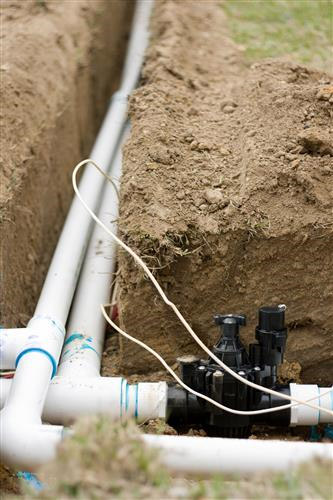Winter Preparation for Sprinkler Systems

Once the weather finally cools down, you will want to shut off your sprinkler system and save some energy and water throughout the winter. With this guide, you will know how to shut it down and help to protect it until spring.
Gradually Decrease Watering
Overwatering poses more of a risk to you than possibly damaging your lawn and garden. If you continue to water in the fall as if it were summer, you are wasting both water and energy on an unnecessary task. As the weather cools, gradually cut back on the frequency and duration of your water schedule. By the middle or the end of fall, you should be ready to shut it off.
Shut Off Water Supply
Locate the water supply to your outdoor watering system. It is different from the main water supply to your home. The water supply shutoff valve is at the source of water for your sprinkler system, which is often flush with the ground and under a green access cover. Shut off the water supply to ensure that water does not continue to flow through your sprinkler system.
Turn Off Irrigation System
You have a few choices to turn off your irrigation system. If you have a simple manual system, you can simply turn it off. Some control panels allow you to set the system to “rain mode” or “off,” without necessarily having to unplug the entire system. If you are genuinely concerned that the sprinkler system may go off accidentally, shut off the circuit breaker to the control panel and unplug the electric wires. This also prevents the system being turned on by children.
Drain Sprinkler System
Once you cut off the water supply and turn off the irrigation system, you may still have pipes that are full of water. You need to drain at least most of the water to prevent freezing during the winter. You may use an automatic drain valve or a manual drain valve to drain pipes. Consult a Sacramento plumbing specialist to learn about using compressed air to clear the pipes.
Insulate Exposed Pipes
The vast majority of your sprinkler system pipes should be underground. Any exposed pipes are more likely to freeze. Consider adding foam pipe insulation to these pipes, which is usually inexpensive and available in self-sticking varieties. Bury any exposed pipes that should be underground. Request service to make sure that your pipes have not suffered any damage as a result of the exposure.
Next spring, you want to be able to turn on your sprinkler system and have it work perfectly from the first day. With these handy tips, you can shut down your sprinklers, clear out your pipes and protect them for the winter months. To learn more about your sprinkler system, contact us at Ace Plumbing.



